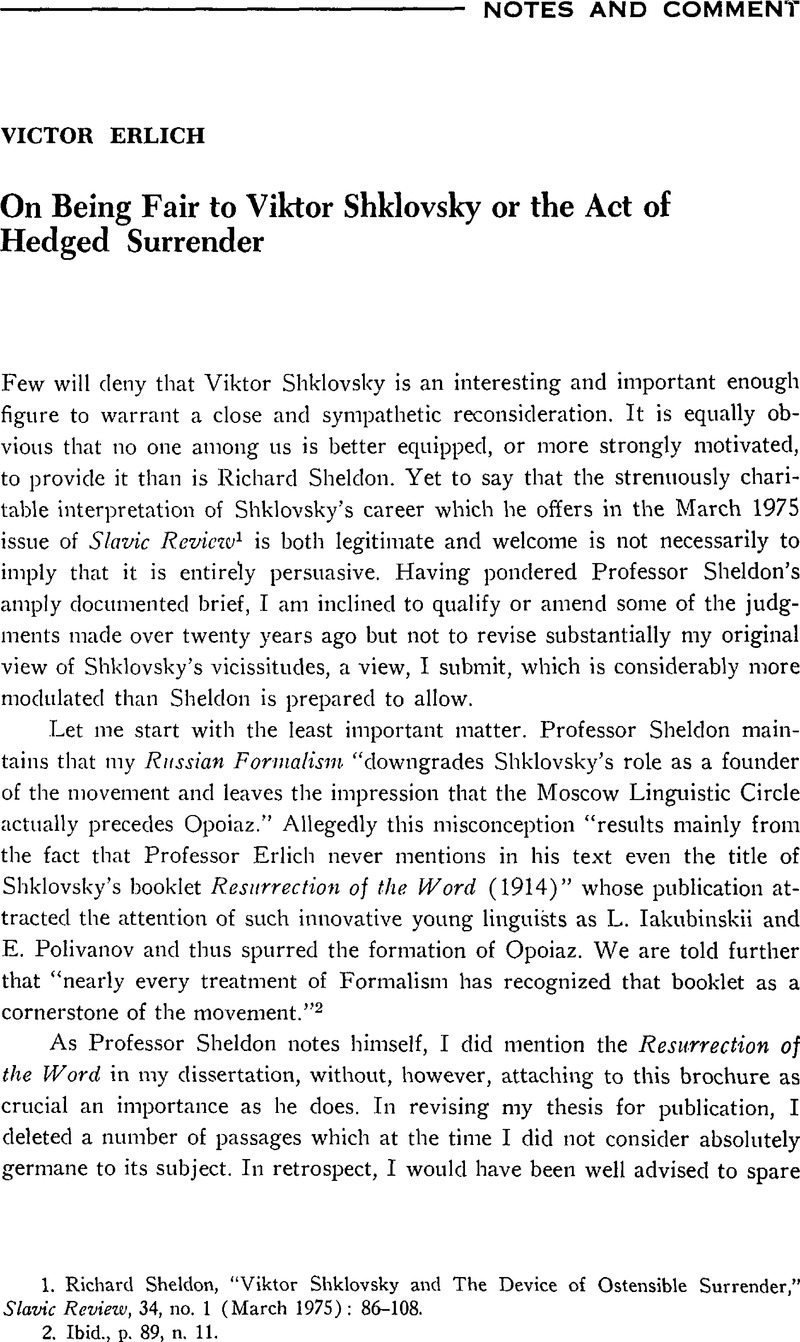Article contents
On Being Fair to Viktor Shklovsky or the Act of Hedged Surrender
Published online by Cambridge University Press: 27 January 2017
Abstract

- Type
- Notes and Comment
- Information
- Copyright
- Copyright © Association for Slavic, East European, and Eurasian Studies. 1976
References
1. Sheldon, Richard, “Viktor Shklovsky and The Device of Ostensible Surrender,” Slavic Review, 34, no. 1 (March 1975): 86–108 CrossRefGoogle Scholar.
2. Ibid., p. 89, n. 11.
3. See Medvedev, Pavel Nikolaevich, Formal'nyi mctod v litcraturovedenii (Leningrad, 1928)Google Scholar; “Teoriia ‘formal'nogo metoda, ’” in Eikhenbaum, Boris, Litcratura: Tcoriia, kritika, polcmika (Leningrad, 1927), pp. 116–48 Google Scholar; and Markov, Vladimir, Russian Futurism: A History (Berkeley, 1968)Google Scholar.
4. Znamia, 1961, no. 10, p. 188.
5. Pomorska, Krystyna, Russian Formalist Theory and Its Poetic Ambiance (The Hague, 1968), p. 1968 Google Scholar.
6. Erlich, Victor, Russian Formalism: History—Doctrine, 3rd ed. (The Hague and Paris, 1969), p. 70 Google Scholar.
7. At least one Western student of Formalism never spoke of a “series of surrenders” nor implied that anything Shklovsky felt impelled to do “hastened or precipitated the collapse of the Formalist movement.” By 1930 the demise of Formalism was a foregone conclusion; Shklovsky's distinctive contribution was being the only Formalist spokesman to proclaim it publicly.
8. Erlich, , Russian Formalism, p. 136 Google Scholar.
9. “Some of it was sound and probably genuine self-criticism” (ibid., p. 136).
10. Parenthetically, I never said that Shklovsky's recantation was “abject,” nor did I fail to record the witch-hunters’ vociferous dissatisfaction with the “Monument.”
11. Iakobson, Roman and Tynianov, Iurii, “Problemy izucheniia literatury i iazyka,” Novyi lef, 1928, no. 12, pp. 36–37 Google Scholar.
12. “As far as I am concerned, Formalism is a thing of the past. All that has remained from the Formal method is terminology … and a number of technological observations. …”
13. Erlich, , Russian Formalism, p. 139 Google Scholar.
14. Shklovskii, Viktor B., “Sukhoplavtsy, ili uravnenie s odnim neizvestnym,” Literaturnaia gazeta, March 31, 1930, p. 2 Google Scholar.
15. Once again the nature of the alleged Western consensus is partly misrepresented —I for one never put it that way, though I may have implied that since 1930 Shklovsky was careful not to deviate too openly from the party line in ideologically charged areas. This, I submit, is still a tenable proposition: the painfully acquired habit of intellectual timidity, writ large in the 1953 collection of essays which Sheldon himself finds “dismal,” has lingered on. The reminiscences about Mayakovsky in Zhili-byli (1961) hew more closely to the canonic view than the selectively candid memoirs of Ilya Ehrenburg's People, Years, Life.
16. Mandelstam, Nadezhda, Hope Against Hope: A Memoir, trans. Hayward, Max (New York, 1970), p. 1970 Google Scholar.
17. Ibid., p. 166.
18. Mandelstam, Nadezhda, Hope Abandoned, trans. Max Hayward (New York, 1974), p. 1974 Google Scholar.
19. Shklovsky, Viktor, A Sentimental Journey: Memoirs, 1917-1922, trans. Sheldon, Richard (Ithaca and London, 1970), p. London Google Scholar.
20. I am referring of course to Lunts's often quoted credo “Why we are Serapion Brothers” (Litcraturnye zapiski, no. 3 [1922], pp. 30-31) which became the manifesto of that remarkable grouping.
- 3
- Cited by




